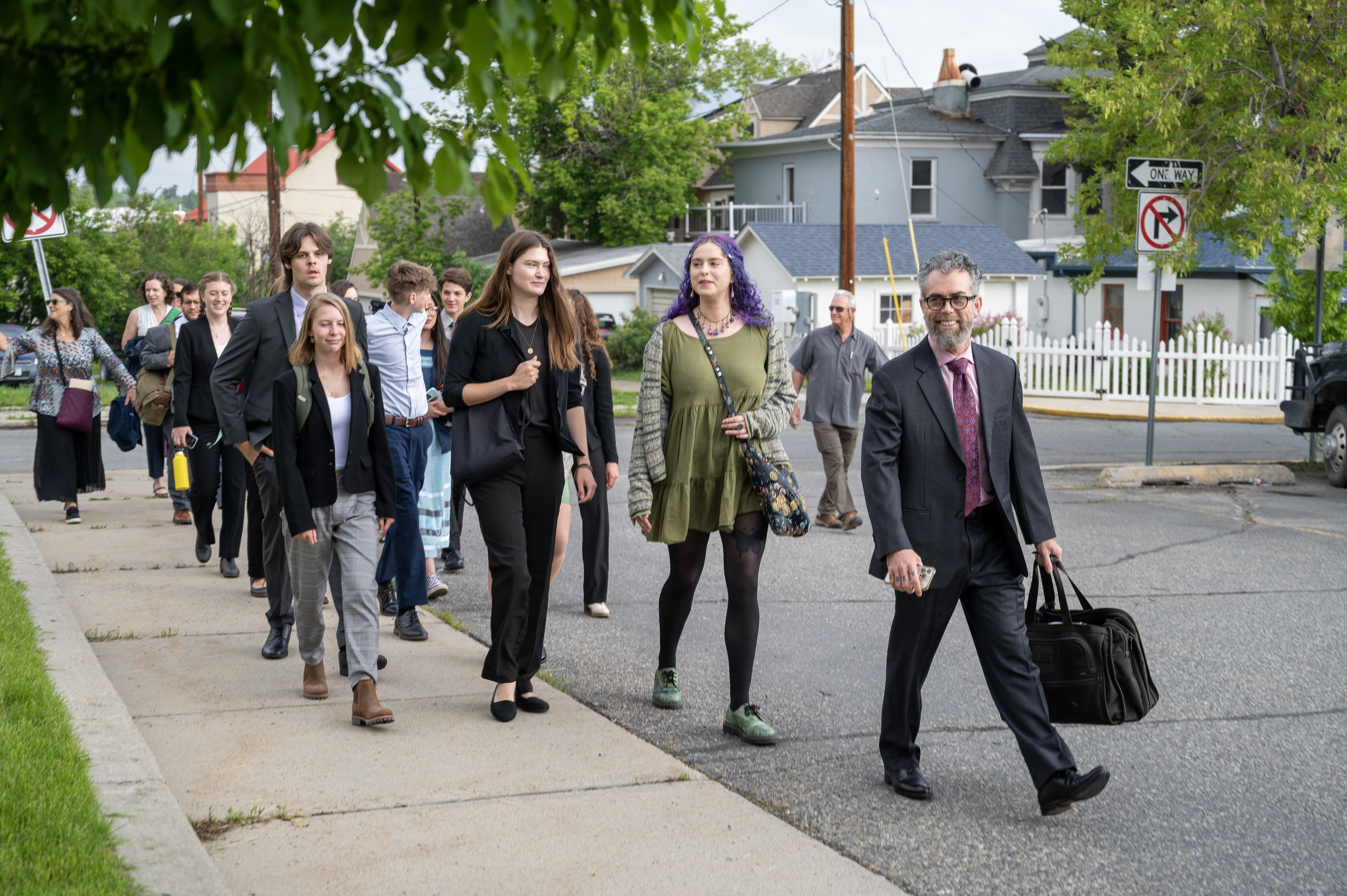A state judge in Montana gave climate activists a decisive win on Monday when she ruled that the state’s support of fossil fuels violates their constitutional right to a clean and healthful environment.
District Court Judge Kathy Seeley struck down as unconstitutional a state policy barring consideration of the impacts of greenhouse gas emissions in fossil fuel permitting. Her ruling establishes legal protection against broad harms caused by climate change and enshrines a state right to a world free from those harms, creating a potential foundation for future lawsuits across the country.
“We are heard!” Kian Tanner, one of the 16 youth plaintiffs in the lawsuit, said in a statement. He grew up near the Flathead River and testified to watching wildfires come ever closer to his home each year. “Frankly, the elation and joy in my heart is overwhelming in the best way. We set the precedent not only for the United States, but for the world.”
The case was the first of its kind to reach trial. Seeley’s decision adds to a growing number of rulings that say governments have a responsibility to protect citizens from climate change. The timing of her verdict — coinciding with major wildfires and heat waves that have taken lives worldwide — couldn’t be more poignant, said Julia Olson. She is the chief legal counsel and executive director of Our Children’s Trust, which has brought similar suits in all 50 states.
“As fires rage in the West, fueled by fossil fuel pollution, today’s ruling in Montana is a game-changer that marks a turning point in this generation’s efforts to save the planet from the devastating effects of human-caused climate chaos,” she said.
Climate change has profoundly shaped the lives of the 16 plaintiffs, both through psychological distress and the damage it has wrought to their homes and cultural heritage. Each has spoken eloquently about smelling wildfire smoke on the wind and feeling trapped by the increasingly oppressive heat of summer on the high plains. All of them have railed against state politicians for not only failing to mitigate the problem, but actively making it worse.
In their lawsuit, they argued that the state’s enthusiastic support of fossil fuels violates their inalienable right, enshrined in Article II of Montana’s constitution, to a “clean and healthful environment.” They also accused the governor and other officials of neglecting their constitutional duty to preserve and protect the environment for future generations. “Although defendants know that the youth plaintiffs are living under dangerous climatic conditions that create an unreasonable risk of harm, they continue to act affirmatively to exacerbate the climate crisis,” the suit states.
For two weeks in June, 12 of the plaintiffs poured their hearts out in a courtroom in Missoula. Their testimony was corroborated by a panel of climate scientists, childhood psychologists, and other experts who spoke to the impacts of a warming world and how it impacts young people.
“I know that climate change is a global issue, but Montana needs to take responsibility for our part,” 22-year-old Rikki Held, the lead plaintiff, testified. “You can’t just blow it off and do nothing about it.”
Seeley agreed. “Every additional ton of greenhouse gas emissions exacerbates Plaintiffs’ injuries and risks locking in irreversible climate injuries,” she wrote in her 108-page ruling. “Plaintiffs’ injuries will grow increasingly severe and irreversible without science-based actions to address climate change.”
The road to the trial was rocky, with the state attempting to throw the case out multiple times. During the trial the state attempted what some termed a “nothing-to-see-here” approach, bringing free-market economists and climate deniers to the fore to convince the judge that permitting and fossil fuel regulation wasn’t really the state’s responsibility. The state also argued that even if it were to stop emitting CO2 entirely, it would have little impact.
Seeley didn’t buy that.
“Montana’s [greenhouse gas] emissions and climate change have been proven to be a substantial factor in causing climate impacts to Montana’s environment and harm and injury to the youth plaintiffs,” she wrote in her ruling. The judge also noted that the state did not offer a compelling argument for why it didn’t consider the impacts of greenhouse gas emissions when making permitting decisions. She also noted that renewable power is “technically feasible and economically beneficial.”
Emily Flower, spokesperson for state Attorney General Austin Knudsen, decried the ruling as “absurd” and called the trial a “taxpayer-funded publicity stunt.” She said the office plans to appeal.
“Montanans can’t be blamed for changing the climate,” Flower said, according to the Associated Press. “Their same legal theory has been thrown out of federal court and courts in more than a dozen states. It should have been here as well, but they found an ideological judge who bent over backward to allow the case to move forward and earn herself a spot in their next documentary.”
Attorneys who participated in the trial say that the verdict is notable because it puts the blame for inaction squarely on the shoulders of state officials, indicating they have the power to change their approach.
Seeley “recognized that the only obstacles to a transition to a clean energy economy in Montana are political,” said Melissa Hornbein, an attorney with the Western Environmental Law Center. “They’re not technological.”
Hornbein hopes the verdict shapes similar suits focusing on governmental responsibility for addressing climate change. Our Children’s Trust also represents 14 young plaintiffs in Hawaiʻi in a similar case, Nawahine v. the Hawaiʻi Department of Transportation, which is now slated to move forward next year.



